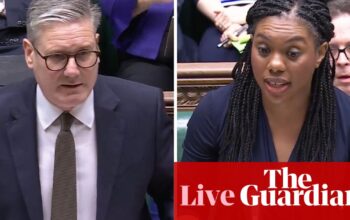Labour must be more ambitious on education if Keir Starmer, as prime minister, is to avoid teachers going on strike as early as this autumn, the leader of the UK’s biggest education union has said, warning that any post-election honeymoon could be short-lived.
Daniel Kebede, the general secretary of the National Education Union (NEU), said goodwill towards a new Labour government would swiftly evaporate without a “radical shift” in policy direction and a loosening of the purse strings by Rachel Reeves, should she become chancellor next month.
In an exclusive interview with the Guardian, he called for full restoration of teachers’ pay by the end of a first parliament, to correct more than a decade of erosion, and warned that Labour would be in for “a rough time” if it failed to invest in children and education.
Pay is likely to be at the top of Bridget Phillipson’s inbox as the new education secretary should Labour win on 4 July. Teachers are keenly awaiting an overdue recommendation from the School Teachers’ Review Body (STRB), the independent experts who advise on pay.
Last year, unions accepted a 6.5% pay rise, which brought to an end a series of strikes, but according to the Institute for Fiscal Studies (IFS), senior teachers have nevertheless seen their salaries fall by 11% in real terms since 2010. The NEU puts it far higher, at about 25%, while the IFS says spending on each child’s education in England has suffered an unprecedented 14-year-freeze under the Conservatives.
The latest STRB recommendation, which is likely to be significantly lower than last year in percentage terms, will be put to NEU members in a snap poll; a ballot of the membership is likely to follow and then possible strike action.
“The situation is dire,” said Kebede. “Morale is at an all-time low amongst the profession and people are crying out for a change in direction. There is a very, very deep crisis that the new government is going to have to confront.

“Any honeymoon period will be short-lived unless teachers and school staff can see a meaningful shift in direction … It won’t take long for the deep expressions of anger that were witnessed last year through the national dispute to come to the fore again.”
Speaking in the wake of significant gains by the far right in European elections, Kebede said he also had “grave concerns” about the consequences for the country if a Labour-led Treasury failed to invest sufficiently to improve public services and deliver meaningful improvements to working people’s lives.
“I’m deeply concerned that there will not be a break from austerity – and without a break from austerity we will see pools of bitterness grow in our communities in which far-right reactionary forces falsely present as solutions to people’s problems.”
Kebede says he wants to give Labour “a good crack of the whip”, but that there is a gulf between the union’s manifesto demands and Labour’s education pledges so far. While Labour has stressed fiscal responsibility, the NEU is calling on the next government to invest £12.2bn next year to start reversing cuts.
The NEU, which has half a million members, says an additional 33,000 teachers are needed to address the recruitment and retention crisis, while Labour has promised 6,500. On child poverty, which is having an impact in classrooms up and down the country, the NEU wants the two-child benefit cap to be scrapped.
Labour’s decision to retain it was “shameful”, said Kebede, pointing out it would cost £1.3bn to lift it – “small change” in government spending terms. “These are political choices. If we have a prospective government not even committing to make that sort of investment in our children, it’s highly problematic.
“There’s a lot of talk around Labour keeping their powder dry to get elected and then things will be OK,” said Kebede, speaking before the launch of Labour’s manifesto on Thursday. “I hope that talk is true. But the reality is we will have to take on any government that doesn’t invest in education.
“There are definitely things we can welcome from an incoming Labour government – they’re committed to a review into curriculum and assessment, they are committed to doing accountability slightly differently, some Ofsted reform.”
after newsletter promotion
He also acknowledged that, given the economic context, there were limitations to what Labour could promise. “But we most definitely do need to see from Labour a commitment to restoring education over the course of a parliament. And to do that we need to see some investment.”
Kebede said Labour’s pledge to invest an additional £1.5bn in state schools by removing private school tax breaks was drop in the ocean. “When you consider the crisis in education at the moment, [the] £1.5bn that the IFS think it will potentially raise doesn’t really cut the mustard.”
He welcomed Labour’s announcement on an additional 3,300 nurseries in existing primary schools, but added: “I would like to see the ambition of Sure Start, if I’m being honest. We’re hearing about fiscal rules and fiscal responsibility – whilst that’s understandable, we need to really see a government that views education and children as an investment rather than a cost.
“I think Labour can do better. But to do better they have to recognise that there does need to be quite a radical shift in direction. The profession is desperate – they need to see change.”
Asked about potential strike action in September, Kebede said: “I really hope we are not in a situation like that. Strike action is the last thing that teachers and school staff want to engage in.” But he warned: “If Labour don’t deliver they will inevitably face strike action.”
Kebede has great respect for Phillipson, with whom he has developed a good working relationship. “I think the incoming education secretary is committed to improving the life chances and outcomes of working-class children.
“The challenges for us as representatives of the education profession are around the Treasury. It’s Rachel Reeves who will hold the purse strings, along with the prime minister.
“Labour should focus on school funding, the recruitment and retention crisis and child poverty – and really any proposed reforms that don’t deal with those three issues fundamentally could well risk just hitting the sand.”
The Labour party has been approached for comment.
Source: theguardian.com


